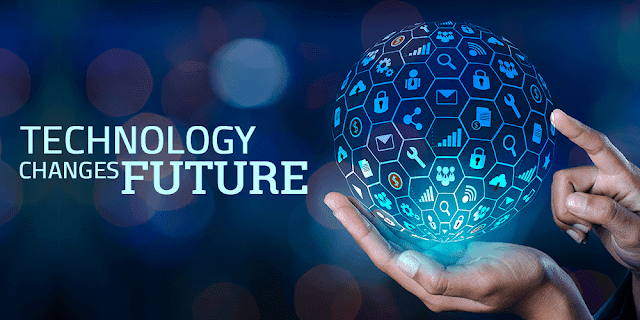Technology will continue to advance and change the way we live and work in the future. Advances in areas such as artificial intelligence, virtual reality, and 5G networks can be expected, resulting in more efficient and connected societies.
1- Artificial Intelligence (AI) :
AI is also expected to play an important role in addressing global issues like climate change, poverty, and disease. AI-powered systems can be used to optimize energy consumption and reduce carbon emissions, analyze satellite imagery to detect deforestation, and analyze medical data to identify and track disease outbreaks.
- Healthcare includes artificial intelligence-powered medical diagnostic systems, drug discovery and development, and personalized medicine.
- Finance: Artificial intelligence-powered fraud detection and financial forecasting.
- Transportation: Self-driving cars, intelligent traffic management systems, and drone delivery are all on the horizon.
- Predictive maintenance, quality control, and supply chain optimization are all aspects of manufacturing.
- Retail: personalized product recommendations, inventory management, and customer service chatbots.
- Precision farming, crop monitoring, and livestock management are all examples of agriculture.
- Predictive maintenance and optimization of power grids, as well as renewable energy forecasting.
- Humanoid robots, drones, and self-driving vehicles are examples of robotics.
- AI-powered tutoring systems and personalized learning in education.
2- Internet of Things (IOT):
The Internet of Things (IOT) is a rapidly expanding field with the potential to transform many industries and aspects of our everyday lives.
Sensors, software, and connectivity are built into IOT devices, allowing them to collect and share data over the internet. This information can be used to boost efficiency, cut costs, and open up new opportunities.
Major Benefits :
- IOT is the ability to automate and improve processes. In a manufacturing setting, for example, IOT devices can be used to monitor equipment performance and predict when maintenance is required, reducing downtime and increasing productivity.
- IOT devices in the healthcare industry can be used to remotely monitor patients' vital signs and alert careers to any changes.
Upcoming projects :
A lot of projects have been developed or are currently being developed across a wide range of industries and fields. Here are a few examples:
- IOT-enabled devices, such as smart thermostats, security cameras, and lighting systems can be controlled remotely and used to improve energy efficiency and security in smart homes.
- IOT in manufacturing, can be used to monitor equipment performance, predict when maintenance is required, and improve overall efficiency.
- Smart cities: Internet of Things-enabled sensors can be used in cities to improve public services like traffic management, waste management, and public transportation.
- IOT devices can be used in self-driving cars to collect and analyze data in order to improve safety and efficiency.
- Environmental monitoring: Sensors enabled by the Internet of Things can be used to monitor air and water quality, weather patterns, and other environmental factors.
3- 5G and 6G:
5G is the fifth generation of cellular network technology, and it is intended to provide faster internet speeds, lower latency, however 6G is being researched and developed.
Do you know ?
A range of frequencies are used by 5G networks, including low-band (below 1 GHz), mid-band (between 6 and 24 GHz), and high-band (above 24 GHz).
Key Features :
5G is its ability to support a much larger number of devices than previous generations of cellular networks. This is known as network densification and is achieved by using a combination of advanced techniques such as beam-forming.
- Directs radio waves towards specific devices, and small cells, which are low-power base stations that can be deployed in areas with high device densities.
4- Robotics and Automation:
As technology advances and the price of automation equipment decreases, robots and automation are anticipated to become more and more significant in the future.
- Future predictions predict that robots and automation will become more and more important as technology develops and the cost of automation equipment falls.
- Numerous sectors, including industry, transportation, and energy, use automation. Programmable logic controllers (PLCs), supervisory control and data acquisition (SCADA) systems, and industrial robots are examples of automation technology.
- Processes like the flow of materials through a factory or the operation of a power plant can be managed and observed using automation.
5- Quantum computing:
Quantum computing is expected to revolutionize fields such as cryptography, drug discovery, and simulation.
Many of the possible uses of quantum computing are still being investigated as it is still in its infancy. However, it is anticipated that quantum computing will have a substantial impact in a number of sectors, including:
- Cryptography: It is important to create new encryption techniques that are resistant to quantum attacks since it is possible that quantum computers will be able to crack many of the encryption algorithms now in use.
- Drug discovery: By simulating the behaviour of complicated molecules using quantum computers, new medications may be discovered.
- Machine learning: The development of machine learning algorithms that can more effectively process massive volumes of data may be made possible by quantum computing.
- Quantum computing may be utilized to improve logistics and transportation in the supply chain.
The entire potential of quantum computing has not yet been fully realized, therefore some of these forecasts may change as the technology develops.
6- Biotechnology:
Advances in gene editing, regenerative medicine, and synthetic biology are expected in the future of biotechnology.
- CRISPR-Cas9 gene editing technologies have the potential to revolutionize medicine by allowing for precise changes to the genetic code of living organisms.
- This could result in new treatments for genetic diseases, increased crop yields, and the development of new industrial products.
- Regenerative medicine involves the use of stem cells and other techniques to repair or replace damaged or diseased cells and tissues.
- This has the potential to revolutionize the treatment of conditions such as diabetes, heart disease, and spinal cord injuries.
These are just a few examples of the many areas where technology is expected to have an impact in the future.







0 Comments